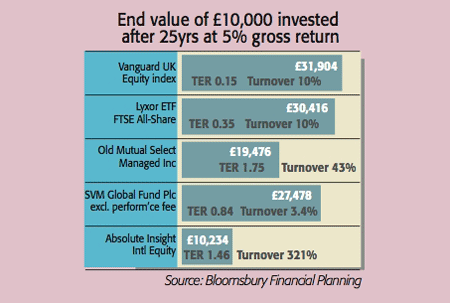Insider blows the whistle on fund management fees
A former fund manager has said that investors are paying far more than they realise for funds, due to hidden costs such as dealing charges, stamp duty and interest on borrowing.

Get the latest financial news, insights and expert analysis from our award-winning MoneyWeek team, to help you understand what really matters when it comes to your finances.
You are now subscribed
Your newsletter sign-up was successful
Want to add more newsletters?

Twice daily
MoneyWeek
Get the latest financial news, insights and expert analysis from our award-winning MoneyWeek team, to help you understand what really matters when it comes to your finances.

Four times a week
Look After My Bills
Sign up to our free money-saving newsletter, filled with the latest news and expert advice to help you find the best tips and deals for managing your bills. Start saving today!
Everyone loves it when an insider spills the beans. And no one has dropped as many as Alan Miller, formerly of New Star Asset Management. He's slammed the fees levied by fund managers as "disgraceful", saying that investors are paying far more than they realise for funds, due to hidden costs such as dealing charges, stamp duty and interest on borrowing.
How much more? Well, the average turnover (the frequency with which a manager sells and buys stocks) on a typical UK unit trust is 57%, estimates Miller. This, says his wealth management firm Spencer-Churchill Miller, means the true cost of investing in an average UK All Companies unit trust comes to 2.8% a year, rather than the oft-quoted total expense ratio (TER) of 1.6%. This is a big deal. Say you invest £10,000 over ten years. Given an annual return of 7%, a fund charging 1.6% would grow to £16,761; but one charging 2.8% would turn into £14,862, a difference of £1,899.
"The industry does not want this to get out," says John Lang at financial planners Tower Hill Associates. He's been highlighting hidden charges for several years, and points to a study done for the Financial Services Authority in 2000 by economist Kevin James. It showed that hidden charges added around 1% to the average TER on a unit trust, but just 0.1%-0.2% to a tracker fund. "So if clients are investing by themselves in a tracker fund, they are probably 2% a year in the money, which is huge."
MoneyWeek
Subscribe to MoneyWeek today and get your first six magazine issues absolutely FREE

Sign up to Money Morning
Don't miss the latest investment and personal finances news, market analysis, plus money-saving tips with our free twice-daily newsletter
Don't miss the latest investment and personal finances news, market analysis, plus money-saving tips with our free twice-daily newsletter

Indeed, if you take your average fund of funds, you're looking at fees of 4% or more, says Jason Butler at Bloomsbury Financial Planners. "So you already have a bloody big mountain to climb" to make up the difference in returns. Given that most fund managers fail to beat the market at all consistently, let alone by 4% a year, there seems little point in the average investor betting on getting lucky.
So what can you do? The good news is that while unit trusts are as costly as ever, trackers are becoming cheaper. As we've noted before, the UK launch of Vanguard, the US index-tracking fund giant, has seen its rivals cut costs too. Lang also points to novel new trackers based on fundamental analysis, from Dimensional Fund Advisors.
One example is their value fund, which invests in companies with low price/book-value ratios. The minimum investment is high at £100,000, but you should be able to invest a smaller amount via a financial adviser.
Get the latest financial news, insights and expert analysis from our award-winning MoneyWeek team, to help you understand what really matters when it comes to your finances.
Jody studied at the University of Limerick and was a senior writer for MoneyWeek. Jody is experienced in interviewing, for example digging into the lives of an ex-M15 agent and quirky business owners who have made millions. Jody’s other areas of expertise include advice on funds, stocks and house prices.
-
 Should you buy an active ETF?
Should you buy an active ETF?ETFs are often mischaracterised as passive products, but they can be a convenient way to add active management to your portfolio
-
 Power up your pension before 5 April – easy ways to save before the tax year end
Power up your pension before 5 April – easy ways to save before the tax year endWith the end of the tax year looming, pension savers currently have a window to review and maximise what’s going into their retirement funds – we look at how
